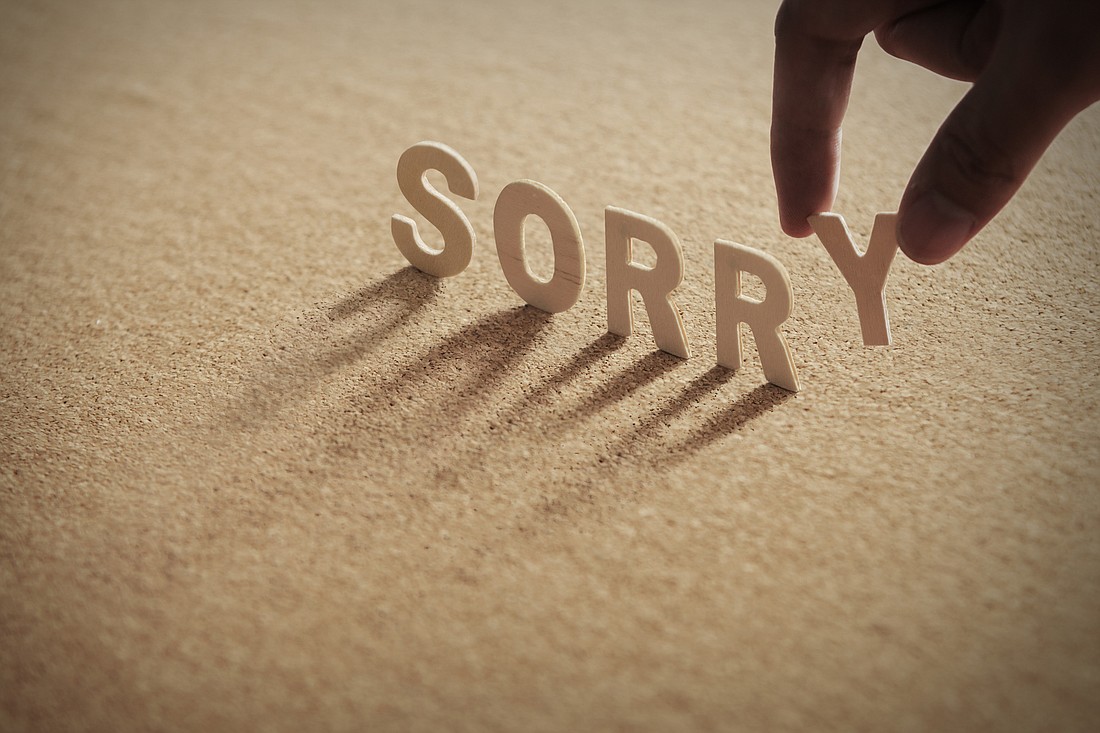
Judge John Guy • 4th Judicial Circuit
The power of a sincere apology is axiomatic.
The words “I’m sorry” have long been thought to be the two most powerful words in the English language. Anyone who has spoken those words while looking into the eyes of the wronged knows this to be true. They heal, they move, they allow for a new beginning.
As Canadian cartoonist Lynn Johnston once quipped, “An apology is the Super Glue of life. It can repair just about anything.”
In the practice of law, apologies are food to the famished. They can impact the present and alter the future and judges appreciate them more than attorneys know.
The outcome of courtroom proceedings matters to attorneys, and to clients. But, like those wearing the black robes, attorneys are human. Mistakes are made. Things happen. We fail to live up to the expectations of others and ourselves.
An error may be the fault of the attorney, or it may be the fault of someone working with the attorney. It may be an honest mistake. It may be intentional.
In the eyes of the court, a sincere apology can hold much greater significance than the misstep. That raises the question of what constitutes a sincere apology.
Many have offered that an apology includes at least four parts: An acknowledgment of error, an expression of regret, an acceptance of responsibility and an offer of restitution.
A sincere apology is all of that and void of any ulterior motive.
When judges observe an attorney apologize sincerely, they see the attorney is aware a problem exists, the attorney is willing to accept responsibility, the attorney is able to admit the wrong without concern of the potential consequences and, most importantly, a sincere apology demonstrates the attorney is willing to put the integrity of the judicial system above himself or herself. All of this reflects positively on the errant attorney.
When such an apology is made outside of a judge’s presence, and later relayed to the court, it is equally meaningful.
Another reason apologies are significant to the court is that they are not required.
In the 229 pages comprising the Rules of Professional Conduct of The Florida Bar the words “apology” and “apologize” do not appear. Nor do those words appear in the American Bar Association’s Model Rules of Professional Conduct.
While attorneys must “pledge fairness, integrity and civility” in their Oath of Admission to The Florida Bar, nowhere are they mandated to apologize for anything.
Apologies also are a friend to judges. An apology in open court can defuse an otherwise tense situation. Apologies between attorneys often eliminate the need for judicial intervention.
Apologies promote trust and model integrity. Almost always, an apology by an attorney instills confidence in the parties and other court observers.
To be sure, a concession of fault can be a powerful ally. Contrarily, the avoidance of fault can do great disservice to everyone involved.
As in all areas of life, attorneys occasionally stumble in their practice. It’s inevitable. It’s understood. How one handles the fall is what matters.
When faced with such an opportunity, attorneys would do well to give great consideration to the virtues of a sincere apology. “I’m sorry” cures many ills. It takes little time and it costs nothing.
Author Mark Matthews said it well: “Apologizing does not always mean you’re wrong and the other person is right. It just means you value your relationship more than your ego.”
In the practice of law, an apology can go even further than that.
Fourth Judicial Circuit Judge John Guy was appointed to the bench in 2015 after 22 years in the State Attorney’s Office.